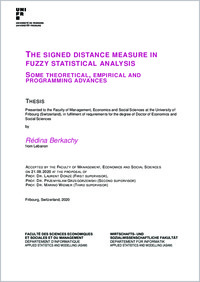The signed distance measure in fuzzy statistical analysis : Some theoretical, empirical and programming advances
- Berkachy, Rédina
- Donzé, Laurent (Degree supervisor)
-
2020
1 ressource en ligne (341 pages)
Thèse de doctorat: Université de Fribourg, 2020
English
This thesis intends to present some advances in fuzzy statistical analyses. A particular distance between fuzzy numbers called the signed distance, seems to be appealing because of its directional property. It has the ability of describing the direction of travel between two fuzzy numbers. In addition, it has been often used as a fuzzy ranking tool or a defuzzification operator. Despite the fact that this distance appears to have interesting properties, it presents serious drawbacks. To overcome these problems, this thesis develops improved versions of it given by two L2 metrics for which the first one is directional and preserves the properties of the signed distance, and the other one is non-directional. Both sophisticated distances have the advantage of taking into consideration the shapes of the fuzzy numbers and their possible irregularities. The core aim of this thesis is therefore to apply these novel distances in a serie of statistical approaches defined on the set of fuzzy numbers. Based on the proposed distances, this thesis provides a methodology of testing hypotheses in the fuzzy environment. This method of testing relies on the estimation of fuzzy confidence intervals, where we consider not only the data as fuzzy, but also the hypotheses. As such, the defended distances are used at different stages of the process of the inference test: in the conception of the models themselves or as defuzzification operators of the obtained fuzzy decisions. Moreover, since the traditional way of estimating fuzzy confidence intervals is in some sense limited in terms of the chosen parameters and the involved distributions, this thesis presents a practical procedure of estimation of such intervals based on the likelihood method. This new procedure is seen as general, since it can be used with any type of parameter and without the obligation of a priori defining a particular distribution. Analogously to this testing model, a definition of the fuzzy p-value described in the same setups with its corresponding decision rule is given. In this context, a defuzzification of this fuzzy p- value can be of good use to get a crisp interpretable decision. Furthermore, this thesis presents two conceptually different applications in which the defended distances are involved. On a first stage, a novel methodology of assessment of linguistic questionnaires is developed on two distinct levels: the global and the individual ones. The proposed procedure has the great possibility of being able to treat the sampling weights and the eventual missingness occurring in the concerned data sets. The second application consists on an extension of the multi-ways analysis of variance to the space of fuzzy sets. The decision related to the corresponding test statistic can be made according to two decision rules: a heuristic one preserving the fuzzy nature of the sums of squares, and another crisp one based on the defended distances. To illustrate these approaches, multiple empirical and simulation studies are displayed using synthetic and real data sets. Note that a prominent objective of these studies is to investigate empirically some different statistical contexts, and theoretically the use of the newly introduced distances compared to known ones from one side, and to the results obtained from the conventional statistical theory from another one. A recurrent general finding is that the classical approach seems to be a particular case of the fuzzy one. As such, the mentioned fuzzy approaches seem to be potentionally promising. A coherent R package covering all the previously mentioned concepts with complete documentation and some use cases are finally described. This package is developed from scratch in compliance with all the theoretical tools presented in a user-friendly comprehensive programming environment with a big panoply of calculation methods.
- Faculty
- Faculté des sciences économiques et sociales et du management
- Language
-
- English
- Classification
- Applied sciences
- Notes
-
- Ressource en ligne consultée le 31.08.2020
- License
-
License undefined
- Identifiers
-
- RERO DOC 328901
- RERO R009073613
- URN urn:nbn:ch:rero-002-121410
- Persistent URL
- https://folia.unifr.ch/unifr/documents/308986
Statistics
Document views: 346
File downloads:
- Texte intégral: 640
